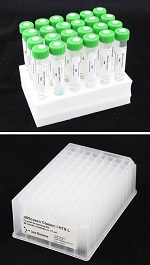Jena Bioscience在结构学研究方面全面提供晶体筛选试剂盒、优化试剂、工具和各类耗材
Pi-minimal Screen CS-127
Pi-PEG Screen CS-128
Pi-minimal Screen HTS CS-211L
Pi-PEG Screen HTS CS-212L

The Pi-Screens were developed at the MRC Laboratory of Molecular Biology (Cambridge, UK) for efficient crystallization screening of soluble proteins (Pi-minimal Screen) and integral membrane proteins (Pi-PEG Screen). The approach is based on incomplete factorial design.
The unique formulation was generated following a strategy named Pi sampling [1] in order to create novel combinations of precipitants, buffers and additives across a standard 96-condition plate layout. Thus, the diversity amongst the crystallization conditions is ideal for initial screening.
The Pi-minimal Screen includes 36 components, i.e. 12 precipitants, 12 buffers systems and 12 salts. Buffers employed in the Pi-minimal screen are buffer systems (acid-base pairs, e.g. HEPES and HEPES sodium salt). Consequently, pH can be adjusted by mixing 2 stock solutions at different ratios during later optimizations.
The efficiency of the Pi-minimal Screen was demonstrated by the crystallization of 10 proteins before its commercialization [1].
The Pi-PEG Screen includes various polyethylene glycol mixtures, additives and buffers covering a pH range from 4,0 – 9,5 and hence is suitable for integral membrane proteins as well as for soluble proteins.
The efficiency of the Pi-PEG screen was demonstrated by the crystallization of a G-protein coupled receptor (GPCR) when quality crystals could not be produced with other commercially available screens.
金畔生物是德国Jena Bioscience代理商,更多产品信息欢迎直接与我们联系
